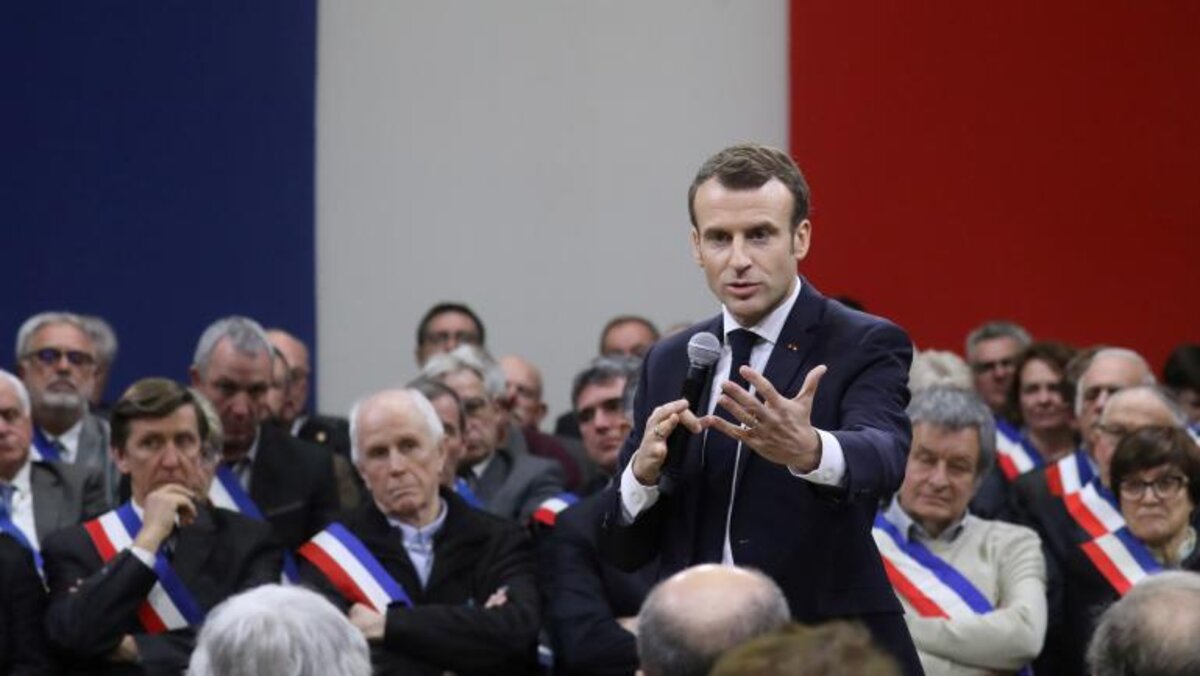This presidency seems determined to provoke anger against it that it would not otherwise attract. The lie about the non-existent “attack” on the Pitié-Salpêtrière hospital in Paris by a horde of violent demonstrators cannot solely be put down to the incompetence of the Minister of the Interior, Christophe Castaner (read Ellen Salvi's article here in French). The claim was repeated over and over again by senior figures, right up to Prime Minister Édouard Philippe himself, and including the health minister Agnès Buzyn and the director of the AP-HP health authority, Martin Hirsch. And it is just the latest in a succession of provocative acts by a government which, ever since the start of the 'yellow vest' protests in November 2018, has constantly sought to impose its will on those who oppose it, using both words of propaganda and acts of repression.
President Emmanuel Macron's demagogic response to the accidental fire at Notre-Dame de Paris last month will remain as a metaphor for what his presidency – in stark contrast to his original promise of a “profound democratic revolution” – has now become: an incendiary presidency. Having disdainfully dismissed people's expectations, which have been reduced to agitation by a politics lacking in spirit or nobility, reduced to the short-term and piecemeal, when as president he alone is responsible for that which is essential and lasting, he immediately seized on this event as if it were a terrible national and psychological ordeal, on the same level as a terrorist attack.
As in the precedents of the 9/11 attacks in the US, which led to the Patriot Act, and the November 2015 terror attacks on the Bataclan music hall and elsewhere in Paris, which led to attempts to strip French citizens of their nationality, the French president then felt it was legitimate for him to plough on regardless, refusing the democratic demands made over the last six months by the 'yellow vest' social movement. Shut away in his presidential ivory tower, he continues to impose his own agenda, rejecting all genuine dialogue, undermining popular protests, calling for police crackdowns, and disdaining words of calm. He arouses class hatred towards less visible groups in society, and maintains fear rather than ensuring there is harmony.

Enlargement : Illustration 1

One dictionary definition of “incendiary” is “tending to create strife, violence”. Since the arrival of the yellow vests in public debate, the government has constantly sought to discredit and delegitimise the movement. In December President Macron dismissed the protestors as a “hateful mob” and at the end of January he scorned them as “rascals in a yellow vest”. He has sought to reduce these protestors to the status of ignorant and dangerous plebs, obscure and threatening figures who have resorted to violence, disruption and bad behaviour, in stubborn ignorance of the new and unprecedented political dynamism of this self-organised movement.
Lies and repression are two sides of the same policy of humiliation and denial of those who, taking their position as citizens seriously, have left their isolation and solitude, and joined with others at protests on roundabouts to share common causes on equality. The official government line which ignores this reality, to the point where it unashamedly invents dark myths about them, goes hand in hand with the concrete desire to erase public expression by undermining the fundamental right to demonstrate, oppose and protest.
“We have a press that no longer seeks the truth,” President Macron dared to declare at the end of July 2018, when he himself was acting as the main shield from media scrutiny of his former security aide Alexandre Benalla as the Benalla affair broke. The contrast between the level of protection afforded to the latter, for whom the president has constantly shown indulgence, and the repression that is constantly demanded against the yellow vests – to the point where unprecedented police violence is seen as routine – is enough to show how the president's comments were in fact an antiphrasis: a phrase that is the exact opposite of what it really means. They are the words of a government which so fears the truth that it will deny it.
Lying seems to have become second nature for this government, as had been fully documented by Mediapart (read Michaël Hajdenberg's article in French here). Since then some new examples have been added to the inventory, such as the sale of arms used in the dirty war in Yemen to various bits of “fake news” about demonstrations – the latest of which were about May Day – and the initial refusal of the ruling La République en Marche's lead candidate for the European elections, Nathalie Loiseau, to acknowledge that she had once stood on a far-right ticket in student elections. The unethical use of social media by the ruling party's instant response units, which is unusual in what is supposedly a party of government, has worsened a climate in which the truth is denied in favour of rumour, slander and insults.
To the regime of permanent coup d’État that already exists, Macronism has added the permanent use of false information. Under it there is no more common reason, no more shared truth, no more understood reality; all that matters are claims that help the government, even if they lack any truth. It is no longer a question of lying to hide things, but of lying to erase them. “The difference between the traditional lie and the modern lie will more often than not amount to the difference between hiding and destroying,” wrote the American philosopher Hannah Arendt.

In her 1971 essay 'Lying in Politics' she underlined the harmful impact on democracy of the “problem solvers” who meddle in the heart of the state and who believe that “politics is but a variety of public relations”. In a prophetic warning, Arendt noted that what these cynical advisors, communications experts, schemers and strategists – of whom the Macron entourage with its former supporters of the former International Monetary Fund boss and politician Dominique Strauss-Kahn has many examples – have “in common with down-to-earth liars” is the “attempt to get rid of facts and the confidence that this should be possible because of the inherent contingency of those facts.”
That is how, under this government, France persists in denying what all the defenders of human rights observe, whether they are French (from the independent ombudsman the Défenseur des Droits to the president of the Commission Nationale Consultative des Droits de l'Homme (CNCDH)) or foreign (from the Council of Europe to the United Nations): and that is the dangerous decline in freedoms in the country which takes pride in having proclaimed the universal declaration of citizens' rights. Consequently, the symbolic violence of the lies and the actual violence of the wrongful repression – accompanied by little restraint or prudence – are stoking the country to boiling point rather than seeking to calm it.
On one occasion Emmanuel Macron declared that people who marched with the yellow vests were “accomplices to the worst”. The expression can easily be turned against him: a government is an accomplice to the worst when, in order to survive, it shatters all democratic ethics, lies repeatedly, abuses freedoms, discredits its own people, slanders its opponents, shows indifference to injustice, pressurises the police into making mistakes, says nothing about those demonstrators who are seriously injured, calls for rapid convictions, and never uses words of compassion or empathy.
This president behaves as if his election victory in 2017 gave him a blank cheque for five years. Yet that is why he is now trapped in a headlong rush that is dangerous for democracy itself, its culture, its institutions and its checks and balances. A dash towards the unknown which could even end in the abyss. For in his blind narcissism, he is mistaken on two counts: about the essence of democracy and on the nature of his election.
Democracy is not the “soft tyranny” that the French philosopher Alexis de Tocqueville discerned, in which the people are invited to come out of their servitude just to choose their master before being dismissed again. It is instead a fragile ecosystem which assumes a separation of powers, active counter-powers and, above all, the permanent expression of the people themselves, guaranteed by respect for those fundamental rights without which the right to vote is no more than a fiction: the right to assemble, to express oneself, to demonstrate and to inform oneself.
As for the 2017 election, given that voters had no other choice than the far-right, it vested in this improbably elected president precisely the thing he does not want to take any notice of: the gnawing French democratic crisis, this “crisis of political representation which has become endemic and almost structural”, to quote the recent verdict of the researcher Anne Muxel (Histoire d’une Révolution Électorale 2015-2018, written with Bruno Cautrès and published by Classiques Garnier). Far from halting this crisis, the new government has made it worse, the academic notes, because it did not take into account the important event that masked Emmanuel Macron's victory: the unprecedented rise in the number of abstentions and spoilt ballot papers.
Many different expressions and reasons have been used to describe the outcome and electoral mandate that stems from the 'coconut shy' 2017 election where so many familiar faces and parties fell, from the fact that politicised voters withdrew from the “political game”, to a “democratic malaise” and a “demand for democratisation of the very machinery of representative politics”. All are far removed from the egocentric personal power incarnated by Emmanuel Macron in his desire for a lofty “Jupiterian” presidency. The yellow vests, whom the government and its intellectual mouthpieces constantly seek to place on the far-right, are first and foremost the political and social expression of this reality of abstentionism: a desire for democracy.
If, over and above their failings and ruses, the substantial economic and social measures that have been obtained from the government by the determined yellow vests – whose effectiveness says a good deal about the impotence of union organisations – are not enough to to calm their anger, it is precisely because their movement carries with it the democratic issue that has been ignored for the last two years. What unifies them in their diversity of backgrounds and leanings is the bitter awareness that the promise of a “profound, democratic revolution” has not been kept; worse, that it has been destroyed and disowned and is now degenerating before our eyes in the form of a profound, democratic regression.
The sudden emergence of the yellow vests corresponded in the autumn of 2018 with the release of the film by Pierre Schoeller, Un Peuple et son Roi, literally 'A People and their King' (screened in English under the title 'One Nation, One King'), which tells the story of how the French people quickly lost their affection for Louis XVI in 1789, leading to the overthrow of the Ancien Regime. Because he refuses to question the worn-out elected monarchy over which he presides, because he prefers the comforting illusion of lies and repression, Emmanuel Macron risks becoming a king without a people.
--------------------------------------------------------------------
The French version of this article can be found here.
English version by Michael Streeter


